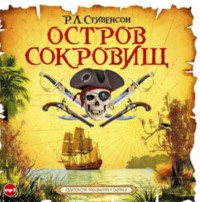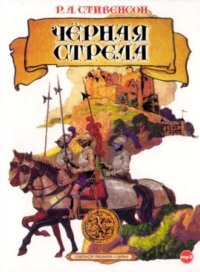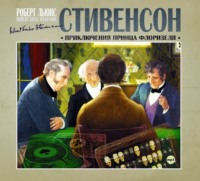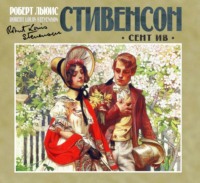 полная версия
полная версияMemories and Portraits
Or perhaps, again, a proportion of readers stumble at the threshold. In so vast a mansion there were sure to be back stairs and kitchen offices where no one would delight to linger; but it was at least unhappy that the vestibule should be so badly lighted; and until, in the seventeenth chapter, d’Artagnan sets off to seek his friends, I must confess, the book goes heavily enough. But, from thenceforward, what a feast is spread! Monk kidnapped; d’Artagnan enriched; Mazarin’s death; the ever delectable adventure of Belle Isle, wherein Aramis outwits d’Artagnan, with its epilogue (vol. v. chap. xxviii.), where d’Artagnan regains the moral superiority; the love adventures at Fontainebleau, with St. Aignan’s story of the dryad and the business of de Guiche, de Wardes, and Manicamp; Aramis made general of the Jesuits; Aramis at the bastille; the night talk in the forest of Sénart; Belle Isle again, with the death of Porthos; and last, but not least, the taming of d’Artagnan the untamable, under the lash of the young King. What other novel has such epic variety and nobility of incident? often, if you will, impossible; often of the order of an Arabian story; and yet all based in human nature. For if you come to that, what novel has more human nature? not studied with the microscope, but seen largely, in plain daylight, with the natural eye? What novel has more good sense, and gaiety, and wit, and unflagging, admirable literary skill? Good souls, I suppose, must sometimes read it in the blackguard travesty of a translation. But there is no style so untranslatable; light as a whipped trifle, strong as silk; wordy like a village tale; pat like a general’s despatch; with every fault, yet never tedious; with no merit, yet inimitably right. And, once more, to make an end of commendations, what novel is inspired with a more unstrained or a more wholesome morality?
Yes; in spite of Miss Yonge, who introduced me to the name of d’Artagnan only to dissuade me from a nearer knowledge of the man, I have to add morality. There is no quite good book without a good morality; but the world is wide, and so are morals. Out of two people who have dipped into Sir Richard Burton’s Thousand and One Nights, one shall have been offended by the animal details; another to whom these were harmless, perhaps even pleasing, shall yet have been shocked in his turn by the rascality and cruelty of all the characters. Of two readers, again, one shall have been pained by the morality of a religious memoir, one by that of the Vicomte de Bragelonne. And the point is that neither need be wrong. We shall always shock each other both in life and art; we cannot get the sun into our pictures, nor the abstract right (if there be such a thing) into our books; enough if, in the one, there glimmer some hint of the great light that blinds us from heaven; enough if, in the other, there shine, even upon foul details, a spirit of magnanimity. I would scarce send to the Vicomte a reader who was in quest of what we may call puritan morality. The ventripotent mulatto, the great eater, worker, earner and waster, the man of much and witty laughter, the man of the great heart and alas! of the doubtful honesty, is a figure not yet clearly set before the world; he still awaits a sober and yet genial portrait; but with whatever art that may be touched, and whatever indulgence, it will not be the portrait of a precisian. Dumas was certainly not thinking of himself, but of Planchet, when he put into the mouth of d’Artagnan’s old servant this excellent profession: “Monsieur, j’étais une de ces bonnes pâtes d’hommes que Dieu a fait pour s’animer pendant un certain temps et pour trouver bonnes toutes choses qui accompagnent leur séjour sur la terre.” He was thinking, as I say, of Planchet, to whom the words are aptly fitted; but they were fitted also to Planchet’s creator; and perhaps this struck him as he wrote, for observe what follows: “D’Artagnan s’assit alors près de la fenêtre, et, cette philosophie de Planchet lui ayant paru solide, il y rêva.” In a man who finds all things good, you will scarce expect much zeal for negative virtues: the active alone will have a charm for him; abstinence, however wise, however kind, will always seem to such a judge entirely mean and partly impious. So with Dumas. Chastity is not near his heart; nor yet, to his own sore cost, that virtue of frugality which is the armour of the artist. Now, in the Vicomte, he had much to do with the contest of Fouquet and Colbert. Historic justice should be all upon the side of Colbert, of official honesty, and fiscal competence. And Dumas knew it well: three times at least he shows his knowledge; once it is but flashed upon us and received with the laughter of Fouquet himself, in the jesting controversy in the gardens of Saint Mandé; once it is touched on by Aramis in the forest of Sénart; in the end, it is set before us clearly in one dignified speech of the triumphant Colbert. But in Fouquet, the waster, the lover of good cheer and wit and art, the swift transactor of much business, “l’homme de bruit, l’homme de plaisir, l’homme qui n’est que parceque les autres sont,” Dumas saw something of himself and drew the figure the more tenderly. It is to me even touching to see how he insists on Fouquet’s honour; not seeing, you might think, that unflawed honour is impossible to spendthrifts; but rather, perhaps, in the light of his own life, seeing it too well, and clinging the more to what was left. Honour can survive a wound; it can live and thrive without a member. The man rebounds from his disgrace; he begins fresh foundations on the ruins of the old; and when his sword is broken, he will do valiantly with his dagger. So it is with Fouquet in the book; so it was with Dumas on the battlefield of life.
To cling to what is left of any damaged quality is virtue in the man; but perhaps to sing its praises is scarcely to be called morality in the writer. And it is elsewhere, it is in the character of d’Artagnan, that we must look for that spirit of morality, which is one of the chief merits of the book, makes one of the main joys of its perusal, and sets it high above more popular rivals. Athos, with the coming of years, has declined too much into the preacher, and the preacher of a sapless creed; but d’Artagnan has mellowed into a man so witty, rough, kind and upright, that he takes the heart by storm. There is nothing of the copy-book about his virtues, nothing of the drawing-room in his fine, natural civility; he will sail near the wind; he is no district visitor – no Wesley or Robespierre; his conscience is void of all refinement whether for good or evil; but the whole man rings true like a good sovereign. Readers who have approached the Vicomte, not across country, but by the legitimate, five-volumed avenue of the Mousquetaires and Vingt Ans Après, will not have forgotten d’Artagnan’s ungentlemanly and perfectly improbable trick upon Milady. What a pleasure it is, then, what a reward, and how agreeable a lesson, to see the old captain humble himself to the son of the man whom he had personated! Here, and throughout, if I am to choose virtues for myself or my friends, let me choose the virtues of d’Artagnan. I do not say there is no character as well drawn in Shakespeare; I do say there is none that I love so wholly. There are many spiritual eyes that seem to spy upon our actions – eyes of the dead and the absent, whom we imagine to behold us in our most private hours, and whom we fear and scruple to offend: our witnesses and judges. And among these, even if you should think me childish, I must count my d’Artagnan – not d’Artagnan of the memoirs whom Thackeray pretended to prefer – a preference, I take the freedom of saying, in which he stands alone; not the d’Artagnan of flesh and blood, but him of the ink and paper; not Nature’s, but Dumas’s. And this is the particular crown and triumph of the artist – not to be true merely, but to be lovable; not simply to convince, but to enchant.
There is yet another point in the Vicomte which I find incomparable. I can recall no other work of the imagination in which the end of life is represented with so nice a tact. I was asked the other day if Dumas made me laugh or cry. Well in this my late fifth reading of the Vicomte, I did laugh once at the small Coquelin de Volière business, and was perhaps a thought surprised at having done so: to make up for it, I smiled continually. But for tears, I do not know. If you put a pistol to my throat, I must own the tale trips upon a very airy foot – within a measurable distance of unreality; and for those who like the big guns to be discharged and the great passions to appear authentically, it may even seem inadequate from first to last. Not so to me; I cannot count that a poor dinner, or a poor book, where I meet with those I love; and, above all, in this last volume, I find a singular charm of spirit. It breathes a pleasant and a tonic sadness, always brave, never hysterical. Upon the crowded, noisy life of this long tale, evening gradually falls; and the lights are extinguished, and the heroes pass away one by one. One by one they go, and not a regret embitters their departure; the young succeed them in their places, Louis Quatorze is swelling larger and shining broader, another generation and another France dawn on the horizon; but for us and these old men whom we have loved so long, the inevitable end draws near and is welcome. To read this well is to anticipate experience. Ah, if only when these hours of the long shadows fall for us in reality and not in figure, we may hope to face them with a mind as quiet!
But my paper is running out; the siege guns are firing on the Dutch frontier; and I must say adieu for the fifth time to my old comrade fallen on the field of glory. Adieu– rather au revoir! Yet a sixth time, dearest d’Artagnan, we shall kidnap Monk and take horse together for Belle Isle.
CHAPTER XV. A GOSSIP ON ROMANCE
In anything fit to be called by the name of reading, the process itself should be absorbing and voluptuous; we should gloat over a book, be rapt clean out of ourselves, and rise from the perusal, our mind filled with the busiest, kaleidoscopic dance of images, incapable of sleep or of continuous thought. The words, if the book be eloquent, should run thenceforward in our ears like the noise of breakers, and the story, if it be a story, repeat itself in a thousand coloured pictures to the eye. It was for this last pleasure that we read so closely, and loved our books so dearly, in the bright, troubled period of boyhood. Eloquence and thought, character and conversation, were but obstacles to brush aside as we dug blithely after a certain sort of incident, like a pig for truffles. For my part, I liked a story to begin with an old wayside inn where, “towards the close of the year 17-,” several gentlemen in three-cocked hats were playing bowls. A friend of mine preferred the Malabar coast in a storm, with a ship beating to windward, and a scowling fellow of Herculean proportions striding along the beach; he, to be sure, was a pirate. This was further afield than my home-keeping fancy loved to travel, and designed altogether for a larger canvas than the tales that I affected. Give me a highwayman and I was full to the brim; a Jacobite would do, but the highwayman was my favourite dish. I can still hear that merry clatter of the hoofs along the moonlit lane; night and the coming of day are still related in my mind with the doings of John Rann or Jerry Abershaw; and the words “post-chaise,” the “great North road,” “ostler,” and “nag” still sound in my ears like poetry. One and all, at least, and each with his particular fancy, we read story-books in childhood, not for eloquence or character or thought, but for some quality of the brute incident. That quality was not mere bloodshed or wonder. Although each of these was welcome in its place, the charm for the sake of which we read depended on something different from either. My elders used to read novels aloud; and I can still remember four different passages which I heard, before I was ten, with the same keen and lasting pleasure. One I discovered long afterwards to be the admirable opening of What will he Do with It: it was no wonder I was pleased with that. The other three still remain unidentified. One is a little vague; it was about a dark, tall house at night, and people groping on the stairs by the light that escaped from the open door of a sickroom. In another, a lover left a ball, and went walking in a cool, dewy park, whence he could watch the lighted windows and the figures of the dancers as they moved. This was the most sentimental impression I think I had yet received, for a child is somewhat deaf to the sentimental. In the last, a poet, who had been tragically wrangling with his wife, walked forth on the sea-beach on a tempestuous night and witnessed the horrors of a wreck. 8 Different as they are, all these early favourites have a common note – they have all a touch of the romantic.
Drama is the poetry of conduct, romance the poetry of circumstance. The pleasure that we take in life is of two sorts – the active and the passive. Now we are conscious of a great command over our destiny; anon we are lifted up by circumstance, as by a breaking wave, and dashed we know not how into the future. Now we are pleased by our conduct, anon merely pleased by our surroundings. It would be hard to say which of these modes of satisfaction is the more effective, but the latter is surely the more constant. Conduct is three parts of life, they say; but I think they put it high. There is a vast deal in life and letters both which is not immoral, but simply a-moral; which either does not regard the human will at all, or deals with it in obvious and healthy relations; where the interest turns, not upon what a man shall choose to do, but on how he manages to do it; not on the passionate slips and hesitations of the conscience, but on the problems of the body and of the practical intelligence, in clean, open-air adventure, the shock of arms or the diplomacy of life. With such material as this it is impossible to build a play, for the serious theatre exists solely on moral grounds, and is a standing proof of the dissemination of the human conscience. But it is possible to build, upon this ground, the most joyous of verses, and the most lively, beautiful, and buoyant tales.
One thing in life calls for another; there is a fitness in events and places. The sight of a pleasant arbour puts it in our mind to sit there. One place suggests work, another idleness, a third early rising and long rambles in the dew. The effect of night, of any flowing water, of lighted cities, of the peep of day, of ships, of the open ocean, calls up in the mind an army of anonymous desires and pleasures. Something, we feel, should happen; we know not what, yet we proceed in quest of it. And many of the happiest hours of life fleet by us in this vain attendance on the genius of the place and moment. It is thus that tracts of young fir, and low rocks that reach into deep soundings, particularly torture and delight me. Something must have happened in such places, and perhaps ages back, to members of my race; and when I was a child I tried in vain to invent appropriate games for them, as I still try, just as vainly, to fit them with the proper story. Some places speak distinctly. Certain dank gardens cry aloud for a murder; certain old houses demand to be haunted; certain coasts are set apart for shipwreck. Other spots again seem to abide their destiny, suggestive and impenetrable, “miching mallecho.” The inn at Burford Bridge, with its arbours and green garden and silent, eddying river – though it is known already as the place where Keats wrote some of his Endymion and Nelson parted from his Emma – still seems to wait the coming of the appropriate legend. Within these ivied walls, behind these old green shutters, some further business smoulders, waiting for its hour. The old Hawes Inn at the Queen’s Ferry makes a similar call upon my fancy. There it stands, apart from the town, beside the pier, in a climate of its own, half inland, half marine – in front, the ferry bubbling with the tide and the guardship swinging to her anchor; behind, the old garden with the trees. Americans seek it already for the sake of Lovel and Oldbuck, who dined there at the beginning of the Antiquary. But you need not tell me – that is not all; there is some story, unrecorded or not yet complete, which must express the meaning of that inn more fully. So it is with names and faces; so it is with incidents that are idle and inconclusive in themselves, and yet seem like the beginning of some quaint romance, which the all-careless author leaves untold. How many of these romances have we not seen determine at their birth; how many people have met us with a look of meaning in their eye, and sunk at once into trivial acquaintances; to how many places have we not drawn near, with express intimations – “here my destiny awaits me” – and we have but dined there and passed on! I have lived both at the Hawes and Burford in a perpetual flutter, on the heels, as it seemed, of some adventure that should justify the place; but though the feeling had me to bed at night and called me again at morning in one unbroken round of pleasure and suspense, nothing befell me in either worth remark. The man or the hour had not yet come; but some day, I think, a boat shall put off from the Queen’s Ferry, fraught with a dear cargo, and some frosty night a horseman, on a tragic errand, rattle with his whip upon the green shutters of the inn at Burford. 9
Now, this is one of the natural appetites with which any lively literature has to count. The desire for knowledge, I had almost added the desire for meat, is not more deeply seated than this demand for fit and striking incident. The dullest of clowns tells, or tries to tell, himself a story, as the feeblest of children uses invention in his play; and even as the imaginative grown person, joining in the game, at once enriches it with many delightful circumstances, the great creative writer shows us the realisation and the apotheosis of the day-dreams of common men. His stories may be nourished with the realities of life, but their true mark is to satisfy the nameless longings of the reader, and to obey the ideal laws of the day-dream. The right kind of thing should fall out in the right kind of place; the right kind of thing should follow; and not only the characters talk aptly and think naturally, but all the circumstances in a tale answer one to another like notes in music. The threads of a story come from time to time together and make a picture in the web; the characters fall from time to time into some attitude to each other or to nature, which stamps the story home like an illustration. Crusoe recoiling from the footprint, Achilles shouting over against the Trojans, Ulysses bending the great bow, Christian running with his fingers in his ears, these are each culminating moments in the legend, and each has been printed on the mind’s eye for ever. Other things we may forget; we may forget the words, although they are beautiful; we may forget the author’s comment, although perhaps it was ingenious and true; but these epoch-making scenes, which put the last mark of truth upon a story and fill up, at one blow, our capacity for sympathetic pleasure, we so adopt into the very bosom of our mind that neither time nor tide can efface or weaken the impression. This, then, is the plastic part of literature: to embody character, thought, or emotion in some act or attitude that shall be remarkably striking to the mind’s eye. This is the highest and hardest thing to do in words; the thing which, once accomplished, equally delights the schoolboy and the sage, and makes, in its own right, the quality of epics. Compared with this, all other purposes in literature, except the purely lyrical or the purely philosophic, are bastard in nature, facile of execution, and feeble in result. It is one thing to write about the inn at Burford, or to describe scenery with the word-painters; it is quite another to seize on the heart of the suggestion and make a country famous with a legend. It is one thing to remark and to dissect, with the most cutting logic, the complications of life, and of the human spirit; it is quite another to give them body and blood in the story of Ajax or of Hamlet. The first is literature, but the second is something besides, for it is likewise art.
English people of the present day 10 are apt, I know not why, to look somewhat down on incident, and reserve their admiration for the clink of teaspoons and the accents of the curate. It is thought clever to write a novel with no story at all, or at least with a very dull one. Reduced even to the lowest terms, a certain interest can be communicated by the art of narrative; a sense of human kinship stirred; and a kind of monotonous fitness, comparable to the words and air of Sandy’s Mull, preserved among the infinitesimal occurrences recorded. Some people work, in this manner, with even a strong touch. Mr. Trollope’s inimitable clergymen naturally arise to the mind in this connection. But even Mr. Trollope does not confine himself to chronicling small beer. Mr. Crawley’s collision with the Bishop’s wife, Mr. Melnotte dallying in the deserted banquet-room, are typical incidents, epically conceived, fitly embodying a crisis. Or again look at Thackeray. If Rawdon Crawley’s blow were not delivered, Vanity Fair would cease to be a work of art. That scene is the chief ganglion of the tale; and the discharge of energy from Rawdon’s fist is the reward and consolation of the reader. The end of Esmond is a yet wider excursion from the author’s customary fields; the scene at Castlewood is pure Dumas; the great and wily English borrower has here borrowed from the great, unblushing French thief; as usual, he has borrowed admirably well, and the breaking of the sword rounds off the best of all his books with a manly, martial note. But perhaps nothing can more strongly illustrate the necessity for marking incident than to compare the living fame of Robinson Crusoe with the discredit of Clarissa Harlowe. Clarissa is a book of a far more startling import, worked out, on a great canvas, with inimitable courage and unflagging art. It contains wit, character, passion, plot, conversations full of spirit and insight, letters sparkling with unstrained humanity; and if the death of the heroine be somewhat frigid and artificial, the last days of the hero strike the only note of what we now call Byronism, between the Elizabethans and Byron himself. And yet a little story of a shipwrecked sailor, with not a tenth part of the style nor a thousandth part of the wisdom, exploring none of the arcana of humanity and deprived of the perennial interest of love, goes on from edition to edition, ever young, while Clarissa lies upon the shelves unread. A friend of mine, a Welsh blacksmith, was twenty-five years old and could neither read nor write, when he heard a chapter of Robinson read aloud in a farm kitchen. Up to that moment he had sat content, huddled in his ignorance, but he left that farm another man. There were day-dreams, it appeared, divine day-dreams, written and printed and bound, and to be bought for money and enjoyed at pleasure. Down he sat that day, painfully learned to read Welsh, and returned to borrow the book. It had been lost, nor could he find another copy but one that was in English. Down he sat once more, learned English, and at length, and with entire delight, read Robinson. It is like the story of a love-chase. If he had heard a letter from Clarissa, would he have been fired with the same chivalrous ardour? I wonder. Yet Clarissa has every quality that can be shown in prose, one alone excepted – pictorial or picture-making romance. While Robinson depends, for the most part and with the overwhelming majority of its readers, on the charm of circumstance.
In the highest achievements of the art of words, the dramatic and the pictorial, the moral and romantic interest, rise and fall together by a common and organic law. Situation is animated with passion, passion clothed upon with situation. Neither exists for itself, but each inheres indissolubly with the other. This is high art; and not only the highest art possible in words, but the highest art of all, since it combines the greatest mass and diversity of the elements of truth and pleasure. Such are epics, and the few prose tales that have the epic weight. But as from a school of works, aping the creative, incident and romance are ruthlessly discarded, so may character and drama be omitted or subordinated to romance. There is one book, for example, more generally loved than Shakespeare, that captivates in childhood, and still delights in age – I mean the Arabian Nights– where you shall look in vain for moral or for intellectual interest. No human face or voice greets us among that wooden crowd of kings and genies, sorcerers and beggarmen. Adventure, on the most naked terms, furnishes forth the entertainment and is found enough. Dumas approaches perhaps nearest of any modern to these Arabian authors in the purely material charm of some of his romances. The early part of Monte Cristo, down to the finding of the treasure, is a piece of perfect story-telling; the man never breathed who shared these moving incidents without a tremor; and yet Faria is a thing of packthread and Dantès little more than a name. The sequel is one long-drawn error, gloomy, bloody, unnatural and dull; but as for these early chapters, I do not believe there is another volume extant where you can breathe the same unmingled atmosphere of romance. It is very thin and light to be sure, as on a high mountain; but it is brisk and clear and sunny in proportion. I saw the other day, with envy, an old and a very clever lady setting forth on a second or third voyage into Monte Cristo. Here are stories which powerfully affect the reader, which can be reperused at any age, and where the characters are no more than puppets. The bony fist of the showman visibly propels them; their springs are an open secret; their faces are of wood, their bellies filled with bran; and yet we thrillingly partake of their adventures. And the point may be illustrated still further. The last interview between Lucy and Richard Feveril is pure drama; more than that, it is the strongest scene, since Shakespeare, in the English tongue. Their first meeting by the river, on the other hand, is pure romance; it has nothing to do with character; it might happen to any other boy or maiden, and be none the less delightful for the change. And yet I think he would be a bold man who should choose between these passages. Thus, in the same book, we may have two scenes, each capital in its order: in the one, human passion, deep calling unto deep, shall utter its genuine voice; in the second, according circumstances, like instruments in tune, shall build up a trivial but desirable incident, such as we love to prefigure for ourselves; and in the end, in spite of the critics, we may hesitate to give the preference to either. The one may ask more genius – I do not say it does; but at least the other dwells as clearly in the memory.






